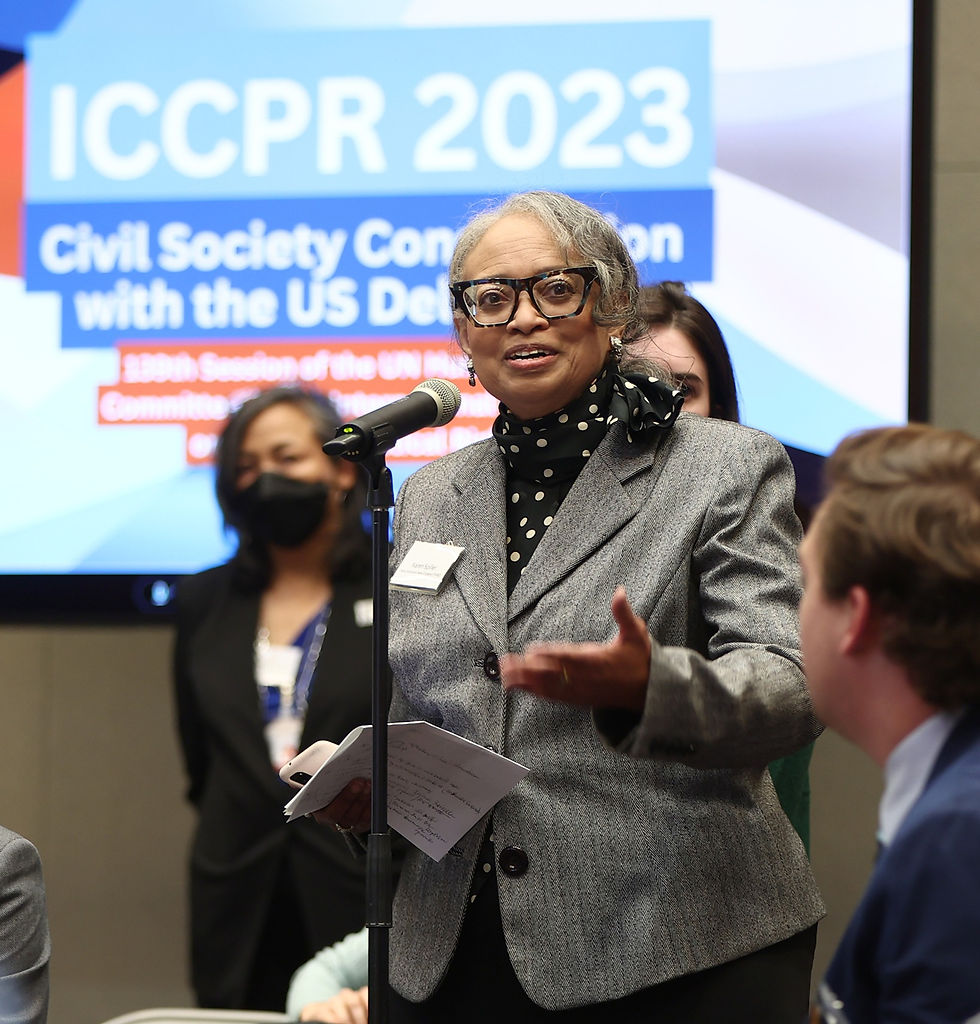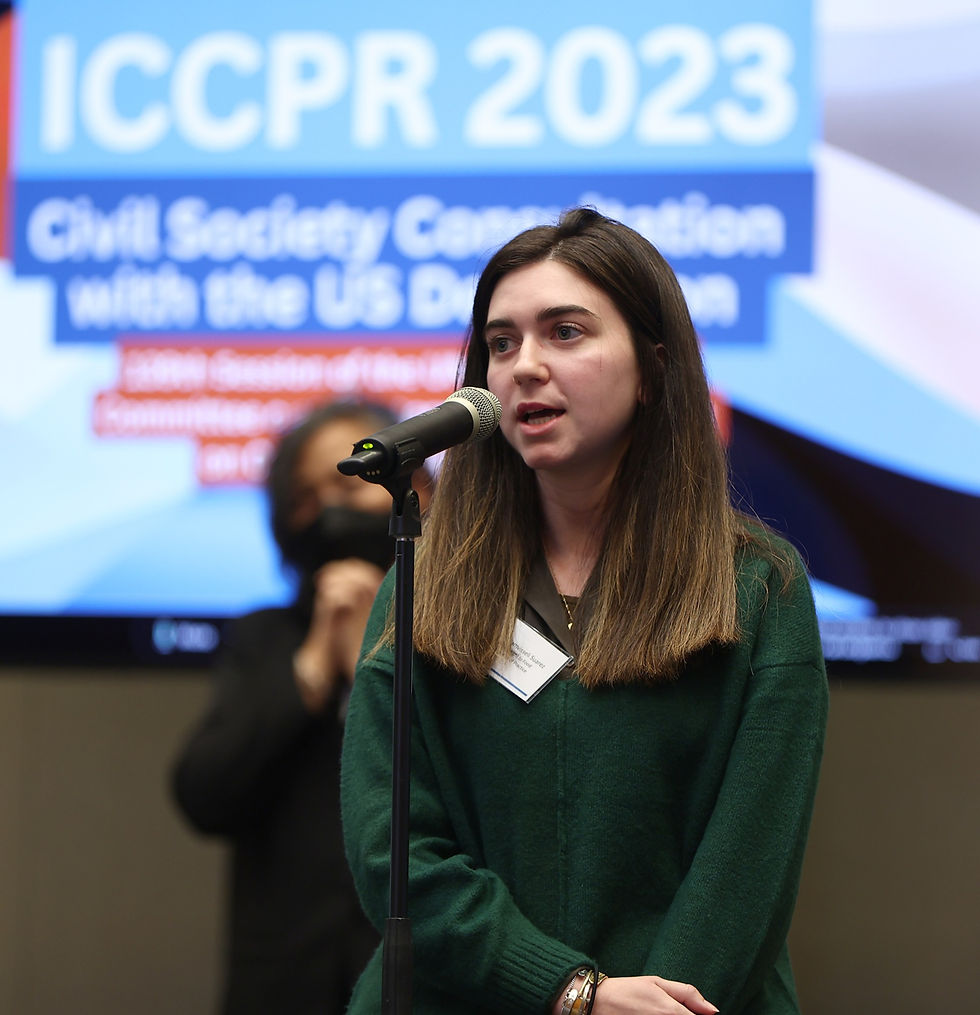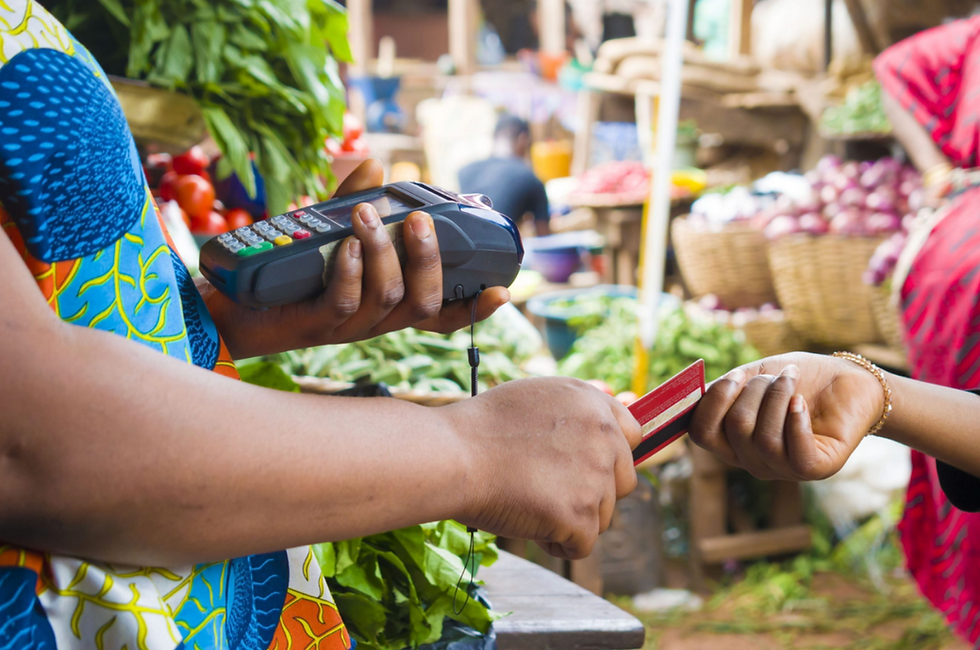Violations of the Right to Food in the U.S. Through the Lens of Civil and Political Rights
- alisoncohenrtf
- Nov 9, 2023
- 4 min read
Updated: Sep 9, 2025
November 9, 2023
Post-Geneva: National RtF Community of Practice and the Human Rights Clinic of the University of Miami Law School Reflect on their Experience during the UN HRC review of the U.S. on Civil and Political Rights

The National Right to Food Community of Practice was among 140 representatives from some 70 U.S.-based civil society organizations in Geneva mid-October for the first review in nine years by the United Nations Human Rights Committee on U.S. compliance with the International Covenant on Civil and Political Rights (ICCPR).
Those advocating that the U.S. consider violations of the right to food through a lens of civil and political rights included: Karen A. Spiller, Food Solutions New England; Denisse Cordova Montes and Photini Kamvisseli Suarez, Human Rights Clinic of the University of Miami Law School. David Peery, Miami Coalition to Advance Racial Equity (MCARE), also provided testimony to right to food violations ongoing in Miami due to a crackdown on feeding the homeless.
“The US government has declined to ratify the International Covenant on Economic, Social and Cultural Rights (ICESCR), which recognizes the Right to Food, claiming that the existing social safety net in federal laws safeguards against hunger,” said Denisse Cordova Montes, Acting Associate Director of the University of Miami Human Rights Clinic and co-founder of the National Right to Food Community of Practice. “By not codifying the Right to Food, however, the U.S. has created conditions whereby control over arable lands, seeds and inputs are increasingly consolidated, workers are exploited all along the food chain, food insecurity remains at 11% of the population, racial injustice is further entrenched, and climate change is accelerated.”

And yet all human rights are indivisible, underscoring that access and availability of food intersects squarely with the ICCPR. The Human Rights Committee’s General Comment No. 36 on the Right to Life explains that “[t]he duty to protect life also implies that States parties should take appropriate measures to address the general conditions in society that may eventually give rise to direct threats to life or prevent individuals from enjoying their life with dignity.” This Committee further clarified that “widespread hunger and malnutrition” are conditions that may give rise to direct threats to life and thus should be construed as violations of the right to life under the ICCPR.
In addition, General Recommendation No. 36 of the Human Rights Committee also said that positive measures “to address adequate conditions for protecting the right to life include, where necessary, measures designed to ensure access without delay by individuals to essential goods and services such as food, water, shelter, health care, electricity and sanitation, and other measures designed to promote and facilitate adequate general conditions.”
While the U.S. has taken some steps to address the concerns of the Committee, as outlined in their state report to this Committee, there is no mention of food insecurity and acts taken to combat it in the state report. The right to food remains overlooked in many aspects, given the fact that it is not enshrined in U.S. law.

As Karen A. Spiller remarked about her experience in Geneva: "Being amongst other passionate U.S. citizens representing their communities in cultures, identities, lived experience to address rights violations that continue over decades and generations was truly humbling. Listening to my Indigenous, Black, Latinx and LGBTQ colleagues give testimony reaffirmed for me how intersectional each of our rights as human beings are. We can't have the right to food if we don't have the right to Indigenous sovereignty, if we don't have the right to housing, if we don't have the right to reparations from slavery."
At one moment during the testimonies being provided by Civil Society to the State Department, it was announced that the meeting had concluded due to a previously scheduled reception. Seeing the substantial line of people still waiting to speak and ask questions, Chief Gary Harrison spoke out and emphasized that these participants had traveled far distances to present their case and question the State Department, not to attend a "party," which led to an extension of the time allotted for Civil Society to speak.

During the 139th Session, the Human Rights Committee questioned the U.S. government about their laws and practices and heard from civil society about the United States’ compliance with the ICCPR. Food justice advocates engaged with the Committee formally and informally and helped shape the questions that were asked of the United States government. In addition, advocates participated in a consultation with the U.S. government and met with staff of the U.N. Special Rapporteurs on the Right to Adequate Food, Rights to Water and Sanitation, Racial Discrimination and Xenophobia, and Rights of Indigenous Peoples to bring attention to violations of the right to adequate food in the United States.
The delegation representing the National Right to Community of Practice posed the following question directly to the Human Rights Committee on October 17th: Given the Biden Administration’s September 2022 White House Conference on Hunger, Nutrition, and Health, what steps does the administration plan to take to ensure that the recommendations that came out of the conference incorporate a rights-based framework, center the voices of people with lived experiences of hunger, and address racial discrimination and the corporate control of the U.S. food system as central elements to begin tackling hunger in the U.S.?
The Committee will issue its concluding observations in November. Watch this blog post for a report out!
Other articles reporting on the HRC Review of U.S. compliance with the ICCPR:



